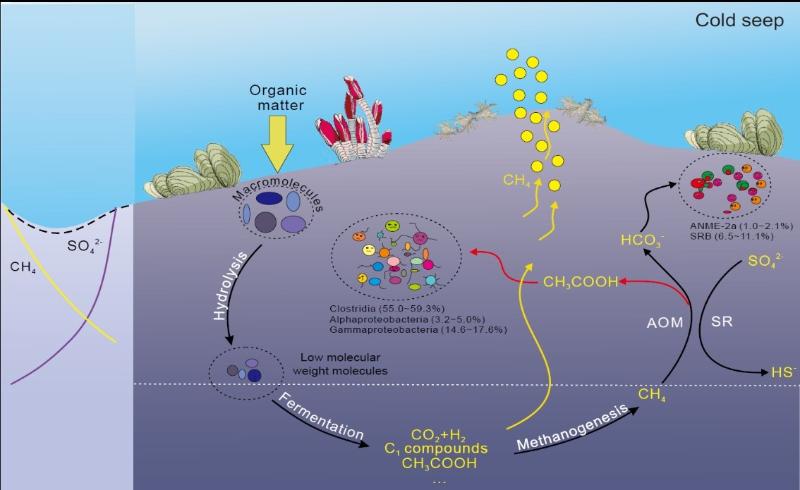Genomic and enzymatic evidence of acetogenesis by anaerobic methanotrophic archaea
Anaerobic oxidation of methane (AOM) mediated by anaerobic methanotrophic archaea (ANME) is the primary process that provides energy to cold seep ecosystems by converting methane into inorganic carbon. Notably, cold seep ecosystems are dominated by highly divergent heterotrophic microorganisms. The role of the AOM process in supporting heterotrophic population remains unknown. Yang investigated the acetogenic capacity of ANME-2a in a simulated cold seep ecosystem using high-pressure biotechnology, where both AOM activity and acetate production are detected. The production of acetate from methane is confirmed by isotope-labeling experiments. A complete archaeal acetogenesis pathway is identified in the ANME-2a genome, and apparent acetogenic activity of the key enzymes ADP-forming acetate-CoA ligase and acetyl-CoA synthetase is demonstrated. Accordingly, Yang proposed a modified model of carbon cycling in cold seeps: during AOM process, methane can be converted into organic carbon, such as acetate, which further fuels the heterotrophic community in the ecosystem.

Proposed conceptual diagram of carbon cycling in cold seeps
This work was supported by: National Key Research and Development Program of China (2018YFC0309800), and National Natural Science Foundation of China (41476123, 91951117, 41921006, 41676177, 41902313, and 91751205).
Shanshan Yang, Yongxin Lv, Xipeng Liu, Yinzhao Wang, Qilian Fan, Zhifeng Yang, Nico Boon, Fengping Wang, Xiang Xiao, and Yu Zhang. (2020). Genomic and enzymatic evidence of acetogenesis by anaerobic methanotrophic archaea. Nature Communications 11(1):1-1.


 loading......
loading......